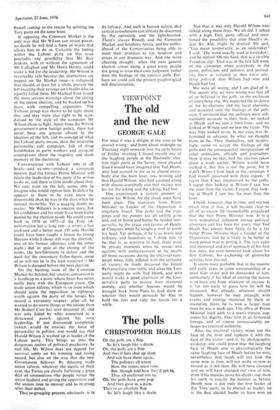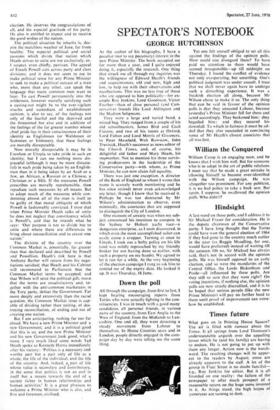VIEWPOINT
The old and the new
GEORGE GALE
For once it was a delight at the time to be proved wrong: and from about midnight on Thursday night onwards into the early hours of Friday morning I found myself one of the laughing people at the Hartwells' elec- tion night party at the Savoy, more pleased than I would have imagined that Ted Heath, who had seemed to me as to almost every- body else the born loser, was winning and that Harold Wilson, who had assumed along with almost everybody else that victory was his for the asking and the taking, had lost.
One experienced a certain amount of sorrow for Wilson, for the shock must have been great. The transition from Prime Minister to Leader of the Opposition is singularly brutal. The perks and the trap- pings and the powers are all swiftly gone and, out of house and home, he resided tem- porarily, by the grace and favour of Heath, at Chequers while he sought a roof to cover his head. Yet perhaps, if he is as brave and ordinary and humdrum as I think him to be, that is, as sensitive to hurt, there must be private moments when he sweats and squirms with embarrassment as he recalls all those occasions during the electoral cam- paign when, fully inflated with the certainty of victory, he freely discussed the future Parliamentary time-table, and what the Tory party might do with Ted Heath, and who would make a good chairman of the Con- servative party to restore their shattered morale, and whether Soames would be brought back from Paris to lead them or whether they would persuade Sir Alec to hold the fort and rally the forces for a while. Not that it was only Harold Wilson who talked along these lines. We all did. I talked with a high Tory party official and men- tioned the possibility that after Heath's de- feat Sir Alec might be drafted. He said, 'You mean temporarily, as an undertaker.'
I said, 'The word usually used is caretaker', and he replied 'Oh my God, that is a terrible Freudian slip'. That was in the last full week of the campaign when everybody in the game, politicians and pollsters and journal- ists, knew as certainly as they knew any- thing political, that Wilson had won and Heath had lost.
We were all wrong, and I am glad of it. The reason why we were wrong was that all of us believed in the polls, to the exclusion of everything else. We neglected the evidence of the by-elections and the local elections, and accepted only the findings of the poll- sters. Convinced that the pollsters were sub- stantially accurate in their finds, we looked at Heath and we saw a born loser; and we looked at Wilson and we saw the victor. The way they looked to us, in our eyes, was de- termined in advance, by what we thought them to be. They themselves, not surpris- ingly, came to accept the findings of the polls and the consequential interpretation of other politicians, officials and journalists. Now it may be that, had the election taken
place a week earlier, Wilson would have walked it. But this is not the point, for it didn't. When I look back at the campaign I find myself possessed with three regrets: I regret that I was mesmerised by the polls; I regret that looking at Wilson I saw less the man than the victor: I regret that look- ing at Heath I saw less the man than the loser.
I think, however, that in time, and not too much time at that, it will become clear to • all of us except the irremediably prejudiced that the best Prime Minister won. It is a very widespread judgment among political observers and has been for years, that Ted Heath has always been likely to be a far better Prime Minister than a Leader of the Opposition; that he is likely to be better at using power than at getting it. The very calm and measured and level approach of his first few days, the even-tenoured look about his first Cabinet, his eschewing of gimmicky activity, bear this out.
It seems most probable that in the months and early years to come statesmanship of a most high order will be demanded of him, particularly if his ideal of uniting the nation is to have any hope whatever of success. It
is far too early to guess how he will be
measured. But already, whatever should happen, however he may entangle with events and emerge mastered by them or mastering them, he is now a larger man than he was a week ago. The office of Prime
Minister itself adds to a man's stature, aug- ments his dignity, fixes him in an historical lineage, and of course immeasurably en- larges his practical authority.
Also, the electoral victory wipes out the face of the loser and replaces it with the
face of the victor—and if, by photographic evidence, one could prove that the laughing face of Heath now is physiologically the same laughing face of Heath before he won. nevertheless that laugh will not look the same now as then, will not strike us now as forced as it did then. He will have changed and we will have changed our view of him, even if his muscles move his cheeks and show
his teeth in exactly the manner as before. Heath now is not only the first leader of
the Tory party to be elected as leader: he is the first elected leader to have won an
election. He deserves the congratulations of all, and the especial gratitude of his party. He also is entitled to expect and to receive the good wishes of the nation.
The political situation he inherits is, des- pite the matchless weather of June, far from healthy. The especial political and social passions which divide that nation which Heath strives to unite are not exclusively, or, I suspect, even chiefly, partisan. The appeal of Enoch Powell cuts across party and class divisions; and it does not seem to me to make political sense for any Prime Minister to seek to make a political outcast of a min who, more than any other, can speak the language that many common men want to hear. To cast Powell permanently into the wilderness, however morally satisfying such a casting-out might be to the ever-vigilant oracles and custodians of establishment opinion, is also to say, of the feelings not only of the fearful and the deprived and the threatened but also and in addition of the feelings of the far greater number whose chief pride lies in their consciousness of their identity as Englishmen (or Welshmen or Scotsmen or Irishmen), that these feelings are morally disreputable.
Now morally disreputable it may be in Erewhon or Utopia to take pride in such an identity; but I can see nothing more dis- graceful (although it may be more distaste- ful) in such pride being taken by an English- man than in it being taken by an Arab or a Jew, an African, a Russian or a Chinese, a Christian or a Sikh. If the measures Powell prescribes are morally reprehensible, then repudiate such measures by all means. But to adopt much of the measures while con- demning almost all of the man is itself to be guilty of that moral obliquity of which Powell is fashionably convicted. I trust that when Prime Minister Heath talks of unity he does not neglect that constituency which is Powell's, and that he intends what he says: 'Our purpose is not to divide but to unite and where there are differences to bring about reconciliation and to create one nation.'
The division of the country over the Common Market is, potentially, far greater than that declared and described by Powell and Powellism. Heath's risk here is that Anthony Barber will return from his nego- tiations satisfied; that Heath and his Cabinet will recommend to Parliament that the Common Market terms be accepted; and that Wilson will seize the political gift, move that the terms are unsatisfactory and, to- gether with the anti-common marketeers in the Tory party, defeat the Government. Far more deeply and extensively than the racial question, the Common Market issue is cap- able of dividing rather than uniting, of des- troying reconciliation, of ending and not of creating one nation.
But I am anticipating, rushing far too far ahead. We have a new Prime Minister and a new Government; and it is a political good
that this is so; and the new Prime Minister and his new Government ,look good, what's more. I very much liked some words Ted Heath spoke to Kenneth Harris immediately after his victory : 'Politics is a necessary and worthy part but a part only of life as a whole, the life of the individual, and the life of the country. And, indeed, ai part of life whose value is secondary and contributory, in the sense that politics is not an end in itself but a means towards the end of a society richer in human relationships and human activities.' It is a great pleasure to welcome a Prime Minister who is also, and first and foremost, civilised.































 Previous page
Previous page